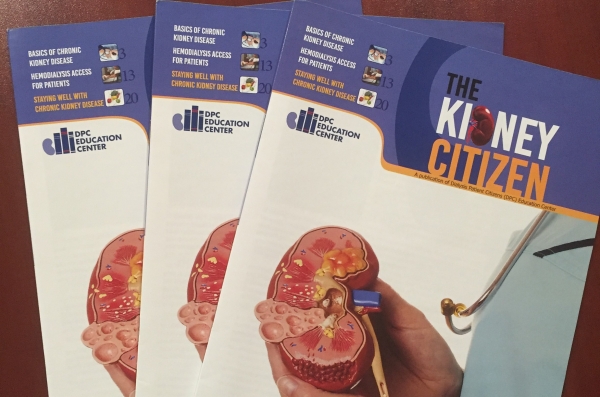News & Events
Discover new information and educational offerings that we provide. Explore our newsletters, blogs and upcoming webinars/conference calls.
Contents:
Racial Disparities in Kidney Transplantation Rates Eased By System’s New Rules
Changes to the system that distributes deceased donor kidneys nationwide helped increase the rates of transplants for African American and Hispanics dialysis patients on the waiting list, according to a new study from Johns Hopkins University. The system’s old algorithm originally gave priority to patients based on how long they had been on the list. In December 2014, the algorithm was changed to give priority to patients based on how long they had been on dialysis. The goal of the changes was to increase transplant accessibility to minorities. To determine whether the changes had any effect, researchers examined transplant records from nearly two years before the new rules were in place to nearly 10 months [...]
DPC Education Center Staff Member Transplant Story Featured in Television News Report
Last summer, DPC Education Manager Joanne Smith successfully donated a kidney to one of her patients. The story was featured in a report done by Philadelphia-based ABC affiliate WPVI. Learn more about the kidney transplant process, and save the date for the next education call: Transplant 101 on February 17th.
Report Identifies Positive News on Kidney Disease in the US, Yet Challenges Remain
The annual data report from the United States Renal Data System (USRDS) reveals both positive and negative trends in kidney disease in the United States. Positive news includes fewer deaths among kidney patients and an increasing use of home dialysis treatments. Ongoing challenges include increasing medical costs for dialysis treatment and an overall increase in the size of the dialysis population. Highlights from the report include: Fewer deaths were reported among dialysis and kidney transplant patients in 2013, dropping by 28 percent and 40 percent, respectively, since 1996. Prevalence of end-stage kidney disease—the last stage of chronic kidney disease when the kidneys can no longer remove waste and excess water from the body, and dialysis [...]
New Website Aims to Inform Latinos About Kidney-related Topics
Kidney failure in the Latino population has increased by more than 70 percent since 2000, according to federal statistics. Researchers and medical professionals find that Latinos are often unfamiliar with the transplant process. A new bilingual website, called Informate, aims to inform Latinos and other Spanish-speaking populations about kidney transplantation. The medium contains fact sheets, quizzes, telenovelas and other materials in both English and Spanish. The website was created to also address cultural concerns Latinos might have about kidney transplantation. The project’s content is provided by the National Kidney Foundation and is available online to anyone, found at informate.org.
Mineral Metabolism
The kidneys help regulate the amount of minerals in the blood. Important minerals include calcium and phosphorous. Calcium and phosphorous help keep our bones strong and healthy. When the kidneys stop working, the amount of minerals in the blood can build up to dangerous levels. When there is too much calcium and/or phosphorous in the blood, it can deposit in the soft tissues in your body, including eyes, heart and lungs. This increases the likelihood of stroke and heart attack and can also decrease the likelihood for a kidney transplant. Mineral levels can be maintained by eating a healthy diet low in these minerals and taking appropriate mineral supplements if needed.
Study Finds Affluent Patients Might Have Advantage for Organ Transplants
Registering with more than one organ transplant center appears to work for wealthy patients over those with the most medical need, according to research presented at the American Heart Association’s Scientific Sessions 2015. Researchers studied the national database of organ donors from 2000 to 2013 and found that patients who simultaneously listed at more than one center had higher transplant rates; lower death rates while waiting, were wealthier and were more likely to be insured. These findings suggest an advantage for wealthier patients who have the money for travel, temporary housing and other costs of multiple listing that are not covered by health insurance, said Raymond Givens, M.D., Ph.D., study lead author and advanced heart [...]
Clinical Trial Results in Early Success for Wearable Artificial Kidney
A portable dialysis machine called the Wearable Artificial Kidney (WAK) is now on the fast track for FDA review within a few years. The status is the result of a clinical trial involving seven ESRD patients undergoing dialysis using the WAK for 24 hours. The device is worn like a tool belt and attached to the patient with a catheter. Researchers say the WAK successfully cleaned the patients’ blood while keeping the fluid and electrolyte levels in a safe range. Patients did not experience any adverse side effects. Since the WAK works continuously, patients were also able to eat a non-restricted diet in the time frame of the trial. While more work is needed on the WAK [...]
Report Connects High Intakes of Salt And Potassium To Quicker CKD Progression
An increased intake of salt and potassium could lead to an increased chronic kidney disease (CKD) progression, according to a study out of the Tulane University in New Orleans. Scientists studied urinary sodium and potassium levels from 3,900 4 CKD patients over a period of three years. CKD progression was defined as developing End State Renal Disease (ESRD) or experiencing a decreased renal function. Results found that CKD patients with the highest salt levels were 54 percent more likely to experience CKD progression and a 45 percent chance of early death. For those with high potassium levels, 59 percent were more likely to experience CKD progression. The report’s authors suggest the results indicate that a [...]
Diabetes Basics Recording
If you missed our last education call on diabetes, be sure to watch the recording below:
Drug Candidate Offers Treatment for Chronic Itch Condition Without Side Effects
“Chronic irritable itch” is defined as a constant itchy sensation that’s difficult to treat, and is a common medical condition among dialysis patients. A study from the Florida campus of the Scripps Research Institute focused on a medication that could treat the condition without the adverse side effects normally associated with medicating the condition. Researchers tested the compound, a combination of opioids and other chemicals, on mouse models to determine effectiveness. The drug compounds target receptors in the central nervous system that moderate pain perception and stress responses. It was found that the combination was successful in stopping the itch without sedation in the models. You can find more information about the study in [...]
Tips to Prepare for Flu Season
With flu season starting, it’s important to protect yourself and others from getting sick. The Kidney Community Emergency Response Program (KCER) offers a few tips for influenza preparedness. Suggestions include avoiding close contact with people who are sick, staying home if you are ill and practicing proper hygiene to prevent the spread of germs. More information can be found on the KCER website.
November Education Call Aims to Increase Diabetes Awareness
Diabetes is one of the primary causes of Chronic Kidney Disease. November is Diabetes Awareness month, which provides the perfect opportunity to further education on the disease and how it can affect your kidney health. Join us Monday, November 2 at 3:00 PM to hear a discussion on ways to manage diabetes to stay as healthy as possible. The call can be viewed online by visiting www.dpcedcenter.org/education-calls or by phone at 1-877-388-5186 conference code: 433-459-5474.
Drug Trial Focuses on Potential Hepatitis C Cure for ESRD Patients
Nearly 8 percent of ESRD patients have Hepatitis C. Medications like Sovaldi have offered a chance to cure Hepatitis C, but are unavailable to ESRD patients due to chemical contents. However, a recent new drug combination has shown potential in curing the Hepatitis C virus in ESRD patients. The drug combination, developed by Merck, was the focus of a recent study involving 224 ESRD patients. The participants were divided into two groups; 116 took a single pill with the two drugs for 12 weeks, while the rest received the placebo. Results showed that 99 percent of the group who took the real pill showed no sign of the virus. Some side effects were reported, but none [...]



